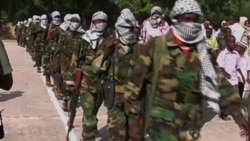LONDON —
The September 21 assault by al-Shabab gunmen on Kenya's Westgate shopping mall in Nairobi claimed the lives of at least 67 people, many of them foreigners. Despite calls for greater Western involvement in the fight against the al-Qaida affiliate, it appears regional forces will continue to take the lead, analysts say.
The victims of the Westgate Mall attack included citizens of countries as far apart as Australia and Britain, Canada and South Korea. Witnesses say the gunmen singled out foreigners and non-Muslims.
But the targeting is unlikely to translate into greater Western intervention against al-Shabab, said Sajjan Gohel, Security Director of the London-based Asia-Pacific Foundation.
“What we’ll probably see is more impetus by the international community, especially the United States, in trying to encourage Somalia’s neighbors in becoming more active, more involved, in trying to dismantle the infrastructure of al Shabab.”
Shiraz Maher of Kings College London’s Center for the Study of Radicalization said Western powers are far more cautious, after tough interventions in Afghanistan and Iraq.
“I think the West now favors having localized countries who are responding to regional crises taking the lead," Maher said. "And they will support from behind the scenes. The level of support might increase, but I don’t think you’d see anything like American direct intervention for example.”
Eliminating the threat from al-Shabab will be highly complex, said Gohel.
“This is a group that has splintered," he said. "Its factions are displaced in a number of countries, not just Somalia. They are recruiting from the refugee populations that exist throughout the Horn of Africa and East Africa. It’s a challenge, it’s a big challenge. And unfortunately, they are also able to recruit from the West," he said.
For now the 17,000-strong African Union contingent in Somalia known as AMISOM will continue to take the lead in battling al-Shabab, alongside government forces.
Nicholas Kay, the United Nations’ envoy for Somalia, has called for the international community to put more resources into fighting al-Shabab.
“Particularly extra resources for the military effort where the AMISOM are under-resourced," Kay said. "They have, for example, not a single military helicopter for a campaign in a country that is the size of Afghanistan."
There is a pressing need for a better-funded African Union force able to respond to threats across the continent, said Helmoed Romer Heitman, a South Africa-based analyst for Jane’s Defense Weekly.
“Outside powers coming into Africa to do it, well the Europeans aren't that willing, and most of them no longer have the clout because they have had to scale down so much," he said. "Do we really want China or India or somebody else doing that? Because they are not going to do it in our interests. They are going to do it in their interests. The U.N. takes too long. We have seen that. So there is a need for a continental force, and in fact regional forces on the continent.”
Analysts say the Westgate mall attack shows that al-Shabab is still a potent force and has a reach extending well beyond Somalia.
The victims of the Westgate Mall attack included citizens of countries as far apart as Australia and Britain, Canada and South Korea. Witnesses say the gunmen singled out foreigners and non-Muslims.
But the targeting is unlikely to translate into greater Western intervention against al-Shabab, said Sajjan Gohel, Security Director of the London-based Asia-Pacific Foundation.
“What we’ll probably see is more impetus by the international community, especially the United States, in trying to encourage Somalia’s neighbors in becoming more active, more involved, in trying to dismantle the infrastructure of al Shabab.”
Shiraz Maher of Kings College London’s Center for the Study of Radicalization said Western powers are far more cautious, after tough interventions in Afghanistan and Iraq.
“I think the West now favors having localized countries who are responding to regional crises taking the lead," Maher said. "And they will support from behind the scenes. The level of support might increase, but I don’t think you’d see anything like American direct intervention for example.”
Eliminating the threat from al-Shabab will be highly complex, said Gohel.
“This is a group that has splintered," he said. "Its factions are displaced in a number of countries, not just Somalia. They are recruiting from the refugee populations that exist throughout the Horn of Africa and East Africa. It’s a challenge, it’s a big challenge. And unfortunately, they are also able to recruit from the West," he said.
For now the 17,000-strong African Union contingent in Somalia known as AMISOM will continue to take the lead in battling al-Shabab, alongside government forces.
Nicholas Kay, the United Nations’ envoy for Somalia, has called for the international community to put more resources into fighting al-Shabab.
“Particularly extra resources for the military effort where the AMISOM are under-resourced," Kay said. "They have, for example, not a single military helicopter for a campaign in a country that is the size of Afghanistan."
There is a pressing need for a better-funded African Union force able to respond to threats across the continent, said Helmoed Romer Heitman, a South Africa-based analyst for Jane’s Defense Weekly.
“Outside powers coming into Africa to do it, well the Europeans aren't that willing, and most of them no longer have the clout because they have had to scale down so much," he said. "Do we really want China or India or somebody else doing that? Because they are not going to do it in our interests. They are going to do it in their interests. The U.N. takes too long. We have seen that. So there is a need for a continental force, and in fact regional forces on the continent.”
Analysts say the Westgate mall attack shows that al-Shabab is still a potent force and has a reach extending well beyond Somalia.





